-
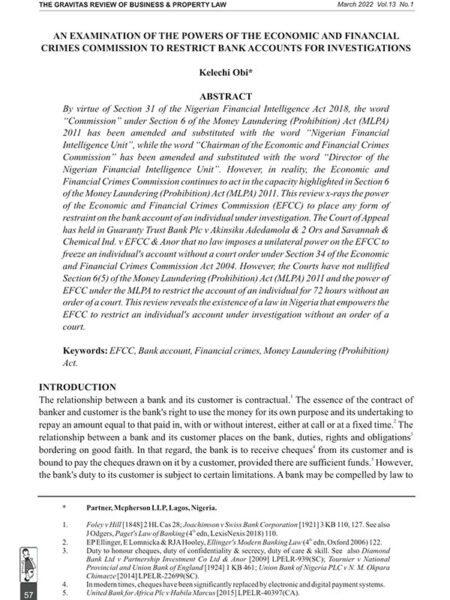
An Examination of the Powers of the Economic and Financial Crimes Commission to Restrict Bank Accounts for Investigations
0₦2,500.00Kelechi Obi, Partner, McPherson LLP, Lagos, Nigeria, in his article, An Examination of the Powers of the Economic and Financial Crimes Commission to Restrict Bank Accounts for Investigations, considers the provisions of the Nigerian Financial Intelligence Act 2018, the Money Laundering (Prohibition) Act 2011 (as amended), the Economic and Financial Crimes Commission Act 2004 in x-raying the powers of the EFCC to place restraint on the bank account of an individual under investigation. Kelechi reviews two crucial decisions of the Court of Appeal on the issue and concludes that there is a law that empowers the EFCC to restrict an individual’s account under investigation without an order of a court.
-
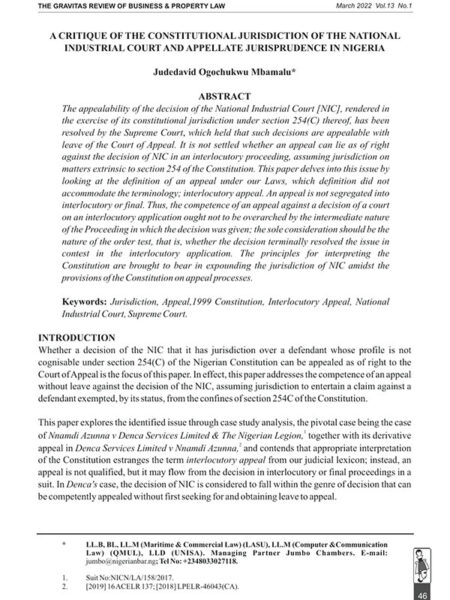
A Critique of the Constitutional Jurisdiction of the National Industrial Court and Appellate Jurisprudence in Nigeria
0₦2,500.00Dr Judedavid Mbamalu, Managing Partner of Jumbo Chambers, in his paper, A Critique of the Constitutional Jurisdiction of the National Industrial Court and Appellate Jurisprudence in Nigeria, argues that while the appealability of the decision of the National Industrial Court (NIC), rendered in the exercise of its jurisdiction under section 254(C) of the 1999 Constitution of Nigeria has been resolved by the Supreme Court, it is not settled whether an appeal can lie as of right against the decision of the NIC in an interlocutory proceeding, assuming jurisdiction on matters extrinsic to section 254. Dr Mbamalu argues that the segregation of appeals into ‘interlocutory’ and ‘final’ is unknown to ‘our Statutes and Rules of Court’, and the competence of an appeal against a decision of a court on an interlocutory application ought not to be overarched by the intermediate nature of the Proceeding in which the decision was given. He elaborates on the principles for interpreting the Constitution in expounding the jurisdiction of the NIC amidst the provisions of the Constitution on appeal processes.
-
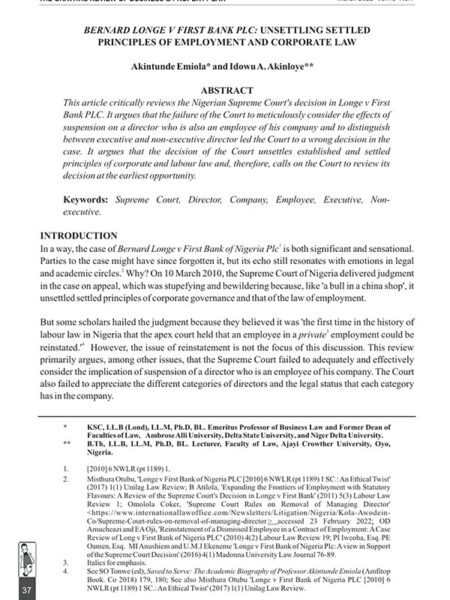
Bernard Longe v First Bank Plc: Unsettling Settled Principles of Employment and Corporate Law
0₦2,500.00Akintunde Emiola, Emeritus Professor of Business Law and Former Dean of Faculties of Law, Ambrose Alli University, Delta State University, and Niger Delta University, and Dr Idowu Akinloye of the Faculty of Law, Ajayi Crowther University, Oyo, Nigeria, in their article, Bernard Longe v First Bank Plc: Unsettling Settled Principles of Employment and Corporate Law, cast a second look at the celebrated Nigerian Supreme Court case. They argue that the failure of the Court to consider the effects of suspension on a director who is also an employee, and to distinguish between an executive and non-executive director led the Court to a wrong decision. Emiola and Akinloye argue that the decision of the Supreme Court unsettles established and settled principles of corporate and labour law and ought to be reviewed at the earliest opportunity.
-
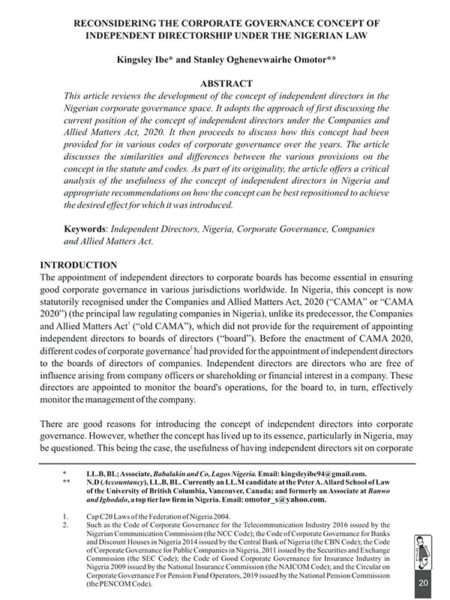
Reconsidering the Corporate Governance Concept of Independent Directorship Under Nigerian Law
0₦2,500.00Kingsley Ibe, Associate at Babalakin & Co and Stanley Omotor, formerly of Banwo and Ighodalo and now an LL.M candidate at the Peter A. Allard School of Law of the University of British Columbia, Canada, in their article, Reconsidering the Corporate Governance Concept of Independent Directorship Under Nigerian Law, note that the concept of independent directorship is now statutorily recognised under the Companies and Allied Matters Act, 2020. Ibe and Omotor review the development of the concept of independent directors in the Nigerian corporate governance space. They examine the regulatory framework for independent directors in Nigeria, the various corporate governance codes, the similarities and differences between the various provisions in the statute and codes. They offer a critical analysis of the usefulness of the concept of independent directors in Nigeria, and recommendations on how the concept can be best repositioned to achieve the desired effect.
-
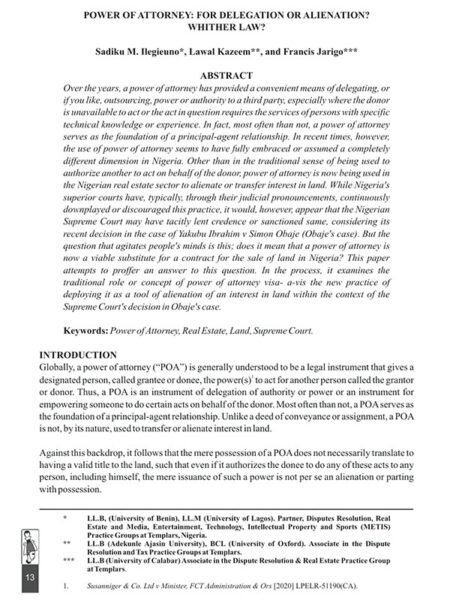
Power of Attorney: For Delegation or Alienation? Whither Law?
0₦2,500.00Sadiku Ilegieuno, Lawal Kazeem and Francis Jarigo, all of Templars, Nigeria, in their article, Power of Attorney: For Delegation or Alienation? Whither Law? note that other than using a power of attorney in the traditional sense to authorize a donee to act on behalf of a donor, power of attorney is now being used in the Nigerian real estate sector to alienate or transfer interest in land. While Nigeria’s superior courts have downplayed or discouraged this practice through their judicial pronouncements, Nigerian Supreme Court may have tacitly lent credence or sanctioned the practice, considering its recent decision in the case of Yakubu Ibrahim v Simon Obaje. Ilegieuno et al. consider whether a power of attorney is now a viable substitute for a contract for the sale of land in Nigeria. They examine the traditional role of the power of attorney vis- a-vis the new practice of deploying it as a tool of alienation of an interest in land within the context of the Supreme Court’s decision in Obaje’s case.
-
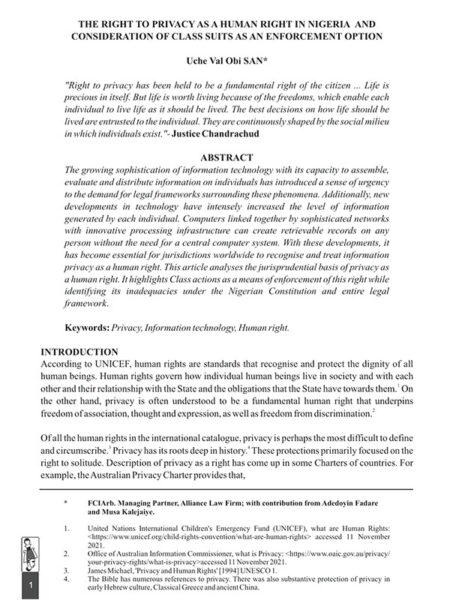
The Right to Privacy as a Human Right in Nigeria and Consideration of Class Suits as an Enforcement Option
0₦2,500.00Uche Val Obi SAN, Managing Partner, Alliance Law Firm, in his article, The Right to Privacy as a Human Right in Nigeria and Consideration of Class Suits as an Enforcement Option, notes that the growing sophistication of information technology with its capacity to assemble, evaluate and distribute information on individuals has introduced a sense of urgency to the demand for legal frameworks surrounding these phenomena. He argues that it has then become essential for jurisdictions worldwide to recognise and treat information privacy as a human right. Val Obi, SAN analyses the jurisprudential basis of privacy as a human right, constitutional and extant legislation on protecting and redressing privacy rights infringement in Nigeria. He highlights Class Action as a means of enforcement of privacy rights while identifying its inadequacies under the Nigerian Constitution and the entire legal framework.
-
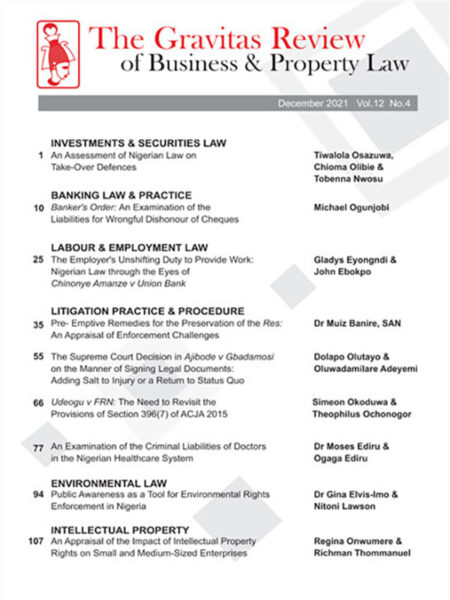
The Gravitas Review of Business & Property Law Vol.12 No.4 – Print
0₦5,000.00In this issue of The Gravitas Review of Business & Property Law Vol.12 No.4, there are well researched articles on:
- Investments & Securities Law
- Banking Law
- Litigation Practice & Procedure
- Environmental Law
- Labour & Employment Law
- Intellectual Property
-

The Gravitas Review of Business & Property Law Vol.12 No.4 – E-Book
0₦5,000.00In this issue of The Gravitas Review of Business & Property Law Vol.12 No.4, there are well researched articles on:
- Investments & Securities Law
- Banking Law
- Litigation Practice & Procedure
- Environmental Law
- Labour & Employment Law
- Intellectual Property
-

The Gravitas Review of Business & Property Law Vol.12 No.4
0₦5,000.00In this issue of The Gravitas Review of Business & Property Law Vol.12 No.4, there are well researched articles on:
- Investments & Securities Law
- Banking Law
- Litigation Practice & Procedure
- Environmental Law
- Labour & Employment Law
- Intellectual Property
-
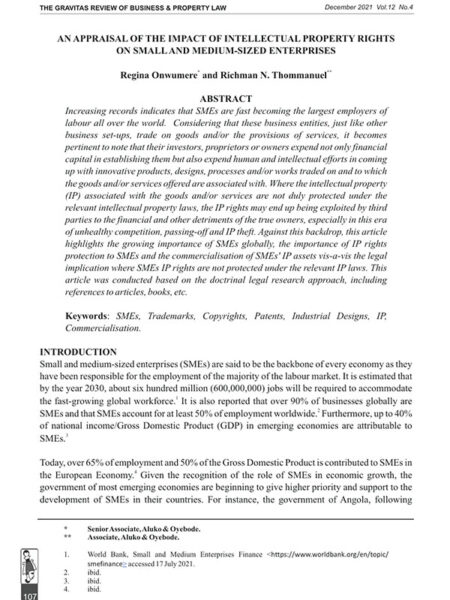
An Appraisal of the Impact of Intellectual Property Rights on Small and Medium-Sized Enterprises
0₦2,500.00Regina Onwumere and Richman Thommanuel, both of Aluko & Oyebode, in their article, An Appraisal of the Impact of Intellectual Property Rights on Small and Medium-Sized Enterprises, indicate that small and medium-sized enterprises (SMEs) are fast becoming the largest employers of labour all over the world. Where the intellectual property (IP) associated with the goods or services produced by SMEs are not duly protected under the relevant intellectual property laws, the IP rights may end up being exploited by third parties to the detriment of the true owners. Against this backdrop, the authors highlight the growing importance of SMEs globally, the importance of IP rights protection to SMEs and the commercialisation of SMEs’ IP assets vis-a-vis the legal implication where SMEs IP rights are not protected under the relevant IP laws.
-
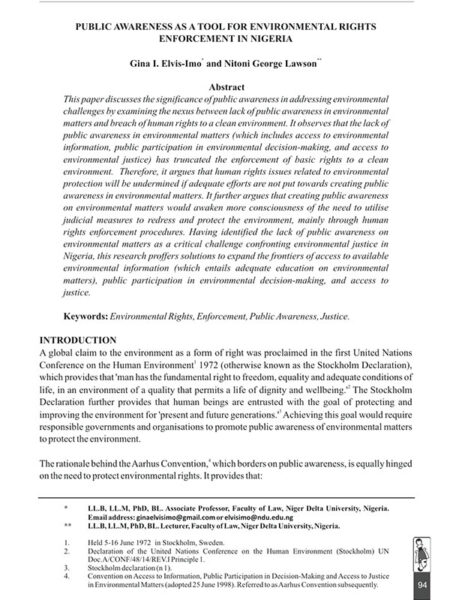
Public Awareness as a Tool for Environmental Rights Enforcement in Nigeria
0₦2,500.00Dr Gina Elvis-Imo and Nitoni Lawson, Associate Professor and Lecturer respectively, at the Niger Delta University, in their article, Public Awareness as a Tool for Environmental Rights Enforcement in Nigeria, discuss the significance of public awareness in addressing environmental challenges by examining the nexus between lack of public awareness in environmental matters and breach of human rights to a clean environment. They argue that human rights issues related to environmental protection will be undermined if adequate efforts are not put towards creating public awareness in environmental matters. Creating public awareness on environmental matters would awaken more awareness of the need to use judicial measures to redress and protect the environment. They then proffer solutions to expand the frontiers of access to available environmental information, public participation in environmental decision-making, and access to justice.
-
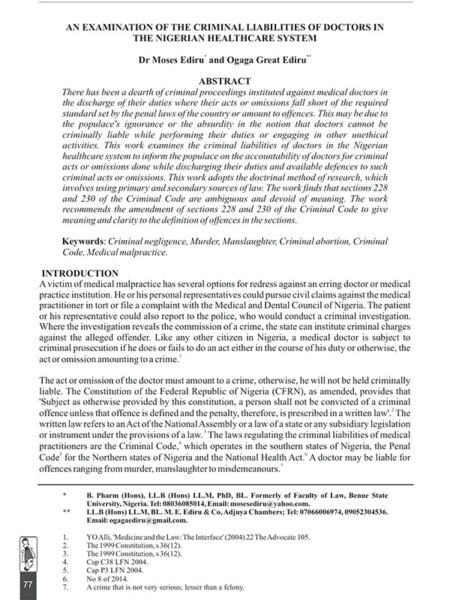
An Examination of the Criminal Liabilities of Doctors in the Nigerian Healthcare System
0₦2,500.00Dr Moses Ediru, formerly of Benue State University, and Ogaga Ediru in their article, An Examination of the Criminal Liabilities of Doctors in the Nigerian Healthcare System, comprehensively examine the criminal liabilities of doctors and how doctors could be made accountable for criminal acts or omissions done while discharging their duties. The authors consider liability for criminal negligence, murder, manslaughter, illegal abortion, and offences under the National Health Act. They also consider defences that are available to a doctor.
The Gravitas Review of Business & Property Law



